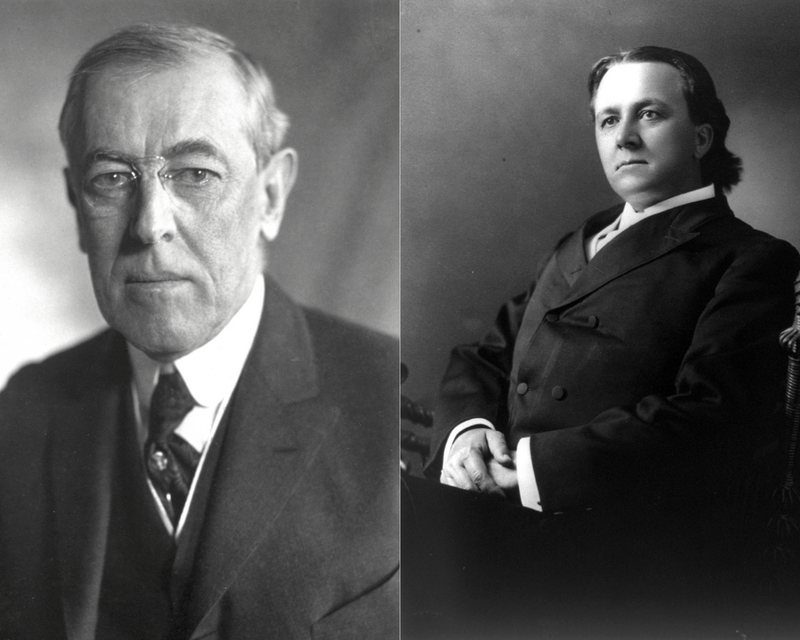Student Work
Mississippi’s Opposition WW I
By: Kienan Brady

28th U.S. President Woodrow Wilson V.S. former Senator James K. Vardaman of Mississippi. Photo credit UBC Library Digitization Centre
Conflict Before The Great War
World War I was one of the deadliest conflicts mankind has ever encountered, with a death toll of over 41 million military and civilian lives taken. Beginning on July 28, 1914, after the assassination of Austro-Hungarian’s Archduke Franz Ferdinand by Serbian nationalist Gavrilo Princip, alliances were enforced causing war to erupt across Europe. With the United States entering the war on April 6, 1917, due to a German U-Boat sinking the Lusitania, taking 148 American lives[1]. World War I affected the United States in many ways overseas and at home. Before America entered the war, it was using the conflict to its advantage by increasing trade deals into Europe and supplying the Allied forces. This increase in trade resulted in a boom in the U.S. economy, creating more jobs in the factories in order to maintain the trade deals. However, once the United States entered the war in 1917, many of the men working these factories were picked up in the draft and volunteered to join the military and the war effort in Europe. This resulted in many women being put into the factories in order to maintain the production line and now supply American troops.
When World War I ended in November of 1918, the men of the U.S. military were sent back home. With the war effort now behind America, the cost of entering the war began to settle in. The Labor Force in America directly following the war was at 44 million personnel with an annual earning of only $802, which equates to $14,400 in modern currency. America began to feel the damage done with the federal government just having revenue of 4.4 million dollars while having spent 15.6 million dollars in expenditures along with 8.6 million dollars spent on military funds. [2] With such military and political spending, the economy began to decline rapidly, especially in Mississippi. For the war effort, 19,296 whites and 24,066 blacks entered the army and, this angered many citizens because the vast majority of Mississippi opposed the war. In addition, the state selected more blacks than whites to be drafted into the military when President Wilson put a temporary pause on black draftees, thus taking more white farm owners and poor rural workers. The state was divided amongst its government and citizens, with the majority opting against it. In 1918 Mississippi’s Senator Vardaman was accused of espionage and treason for disagreeing with President Wilson’s declaration of war when he insisted on speaking for the citizens of Mississippi, calling World War I a “rich man’s war and a poor man’s fight” this resulted in him losing the 1918 Senate election. [3] To combat this, many citizens refuse to buy and pay their war bonds and boycotting business that sold war propaganda. With the state in moderate turmoil, it was hard for business to thrive and get people to buy their goods considering the rebellion. This impacted Neilson’s business profoundly, resulting in an unsteady flow of purchases. Some days Neilson’s would see great business, but then continue into a dry sales week.
Ledger 35, November 15, 1918 from Neilson’s Collection, Department of Archives and Special Collections, The University of Mississippi Libraries.
[1] .Alchin, Linda. 2018. “1913-1928: WW1 & Prohibition.” Progressive Reforn ***. Siteseen Limited. January 9, 2018. http://www.american-historama.org/1913-1928-ww1-prohibition-era/us-entry-into-ww1.htm
[2] “U.S. Economy in World War I.” n.d. EHnet. Accessed January 7, 2019. http://eh.net/encyclopedia/u-s-economy-in-world-war-i/
[3] “World War I: Loyalty and Dissent in Mississippi During the Great War, 1917-1918.” Gambling in Mississippi: Its Early History | Mississippi History Now. Accessed January 07, 2019. http://mshistorynow.mdah.state.ms.us/articles/237/World-War-I-the-great-war-1917-1918-loyalty-and-dissent-in-mississippi
